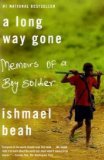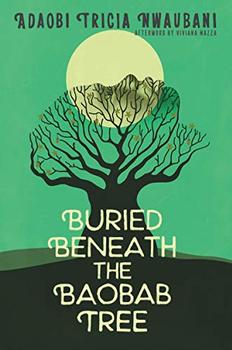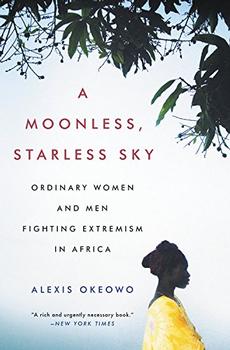Summary | Excerpt | Reading Guide | Reviews | Beyond the book | Read-Alikes | Genres & Themes | Author Bio

Critics' Opinion:
Readers' Opinion:
First Published:
Feb 2007, 240 pages
Paperback:
Aug 2008, 240 pages
 Book Reviewed by:
Book Reviewed by:
BookBrowse Review Team
Buy This Book
Ishamel Beah was a normal 12-year-old boy living in a rural area of Sierra Leone - going to school, forming a rap band in imitation of the American singers he idolized and (perhaps not so usual) reciting speeches from Shakespeare in the town square for the benefit of his father and other members of the community. One day he, his brother and a friend went to the local town to compete in a talent show. While they were away their village was pillaged by rebel forces. In an instant their childhoods were swept away as they fled for their lives not knowing if any of their family were still alive. For months, Beah and a small group of ragged boys, traveled from village to frightened village trying to stay one step ahead of the rebels while finding enough food and water to stay alive.
"They were laughing and giving each other high fives. Two looked slightly older than me. They had blood on their clothes, and one of them carried the head of a man, which he held by the hair. The head looked as if it was still feeling its hair being pulled. Blood dripped from where the neck had once been." Ishmael describing one of the first times he saw rebel soldiers.
Eventually he fell into the hands of the government army and was recruited into the ranks. Indoctrinated and drugged up to the eyeballs on a cornucopia of drugs including brown brown (cocaine mixed with gunpowder) and little white pills that gave him endless energy but deprived him of sleep for weeks, he found himself capable of the most terrible atrocities.
"I am not sure if one of the captives was the shooter [who shot Beah in the foot during a skirmish] but any captive would do at that time. So they were all lined up, six of them, with their hands tied. I shot them in their feet and watched them suffer for an entire day before finally shooting them in the head so that they would stop crying. Before I shot each man, I looked at him and saw how his eyes gave up hope and steadied before I pulled the trigger. I found their somber eyes irritating".
The first hundred pages or so are
taken up with Beah's survival before he is recruited
into the army; a handful of pages cover his
indoctrination into the army; then he skips forward
two years to when he is inexplicably handed over to
UNICEF representatives and taken to a rehabilitation
center in Freetown, capital of Sierra Leone.
The second half of the book covers his
rehabilitation, interspersed with flashbacks to his
time in the military. Condensing his military life
to a few pages in the linear structure of his
memoir, but exploring it in more detail in
hindsight, serves well to illustrate these two years
as he experienced them:
"We had been fighting for over two years, and killing had become a daily activity. I felt no pity for anyone. My childhood had gone by without my knowing, and it seemed as if my heart had frozen. I knew that day and night came and went because of the presence of the moon and the sun, but I had no idea whether it was a Sunday or a Friday."
Eventually, rehabilitation returns some sanity to 15-year-old Beah's life, but it is a hard battle for both the children and the people who care for them. The child soldiers are not benign patients asking to be cured, they are indoctrinated fighting machines who've lived on a diet of drugs and violence for years and do not want to be rehabilitated; those who work with them in the rehabilitation centers risk their lives daily. Even when Beah is considered sufficiently rehabilitated to be released to his uncle and aunt he cannot escape his memories. Just attending a local dance triggers memories of a town that Beah and his comrades attacked during a school dance:
"I could hear the terrified cries of teachers and students, could see the blood cover the dance floor."
Before leaving the rehabilitation
center Beah is marked out as a spokesman for the
center's work, and a lucky break sees him go on an
eye-opening visit to New York to speak at the first
United Nations International Children's Parliament.
You might expect a happy ending at this point, but
this is real-life, not fiction. At the end of the
visit Beah returns to Freetown; shortly after he
returns his nightmares catch up with him as civil
war engulfs the capital, sending him fleeing across
the border for fear of being recruited back into his
old life, or being killed for refusing to rejoin.
Today, 27-year-old Beah lives in New York, staying
in close contact with his adopted mother, Leah
Simms, a Brooklyn-born white Jewish-American who he
met when he first visited the USA, who opened her
home to him when he fled Sierra Leone. If there is a
heartening thread to Beah's harrowing story it is
that wherever there is great evil, there is also the
opportunity for great good, such as the kind man on
the coast who gave six unknown boys shelter despite
the risks to himself; the veritable saints at the
rehabilitation centers; Beah's uncle and aunt who
took their unknown, and potentially dangerous,
nephew into their home to live with their three
adopted children; and Leah and all the others that
Beah notes in his Acknowledgements, who helped him
settle into his new life in New York and proudly
watched him graduate from
Oberlin College in 2004.
Representing the multitude whose stories will never
be heard, Beah's memoir is honest, raw and
unforgettable.
Browse a short excerpt at BookBrowse by clicking the
"Browse" link below, or read an extensive excerpt at
The New York Times.
Note
In 2008, in the wake of the exposure of
various 'fictional' memoirs such as those by James
Frey, The Australian newspaper called into
question some of Beah's claims - not that he had
ever been a child soldier but that certain events
that happened in the course of his narrative were
known to have taken place at times different to his
recollection which, if correct, meant that he could
not have served as a child soldier for as long as
his memoir states and that the age that he would
have joined would have been closer to 15, not 13
years old. Beah denied all The Australian's
allegations and pushed back saying that this was the
second attack by the publication which had formerly
claimed that his father was still alive, which was
later shown to be a case of mistaken identity by an
Australian mining engineer. The controversy
was picked up by a number of international media but
eventually died down with no definitive conclusion
having been reached.
Wikipedia offers a comprehensive summary of the
topic.
![]() This review was originally published in The BookBrowse Review in February 2007, and has been updated for the
August 2008 edition.
Click here to go to this issue.
This review was originally published in The BookBrowse Review in February 2007, and has been updated for the
August 2008 edition.
Click here to go to this issue.

If you liked A Long Way Gone, try these:

Buried Beneath the Baobab Tree
by Adaobi Tricia Nwaubani
Published 2020
Based on interviews with young women who were kidnapped by Boko Haram, a Muslim terrorist group, this poignant novel by Adaobi Tricia Nwaubani tells the timely story of one girl who was taken from her home in Nigeria and her harrowing fight for survival.

by Alexis Okeowo
Published 2018
In the tradition of Behind the Beautiful Forevers, this is a masterful, humane work of literary journalism by New Yorker staff writer Alexis Okeowo - a vivid narrative of Africans who are courageously resisting their continent's wave of fundamentalism.





The House on Biscayne Bay
by Chanel Cleeton
As death stalks a gothic mansion in Miami, the lives of two women intertwine as the past and present collide.

The Flower Sisters
by Michelle Collins Anderson
From the new Fannie Flagg of the Ozarks, a richly-woven story of family, forgiveness, and reinvention.

The Funeral Cryer by Wenyan Lu
Debut novelist Wenyan Lu brings us this witty yet profound story about one woman's midlife reawakening in contemporary rural China.
Your guide toexceptional books
BookBrowse seeks out and recommends the best in contemporary fiction and nonfiction—books that not only engage and entertain but also deepen our understanding of ourselves and the world around us.